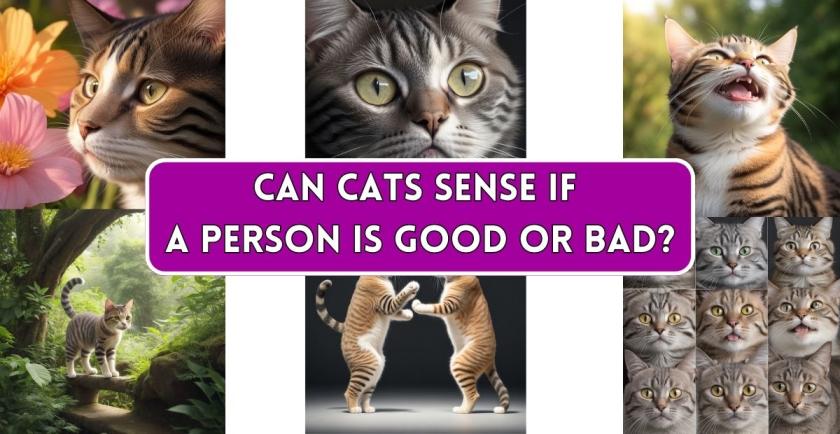Have you ever wondered if your furry feline friend can tell if someone is trustworthy or not? Cats have a knack for appearing mysterious and perceptive, leading to the intriguing question: Can cats sense if a person is good or bad? In this article, we’ll dive into the world of feline intuition and explore the science behind their behavior.
The Sensitive World of Cats:
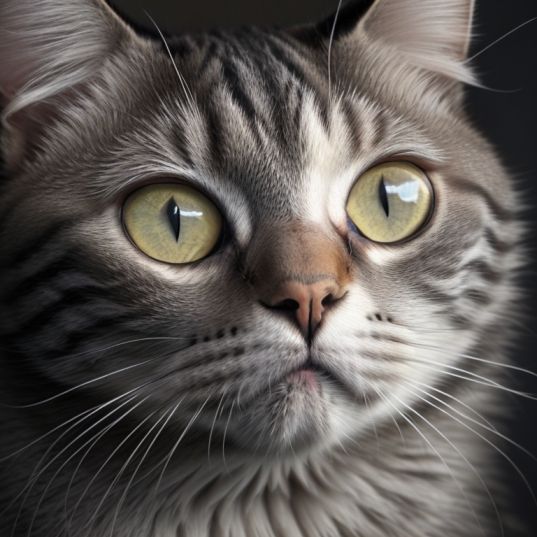
Cats inhabit a world of heightened awareness, where their acute senses make them finely attuned to even the subtlest changes in their environment. Known for their mysterious and perceptive nature, cats often leave us wondering about the depths of their sensitivity. They can appear to react differently to various people, raising questions about whether they possess an innate ability to discern good from bad.
This sensitivity is evident in their reactions to sounds, scents, and movements that might go unnoticed by humans. Their watchful demeanor and quick responses showcase an awareness that extends beyond the obvious. Whether it’s an unexpected noise or a new person entering the room, cats’ finely tuned senses provide them with a unique perspective on the world around them. This heightened sensitivity contributes to the ongoing fascination with cats and their seemingly enigmatic behaviors.
Cats’ Exceptional Senses:
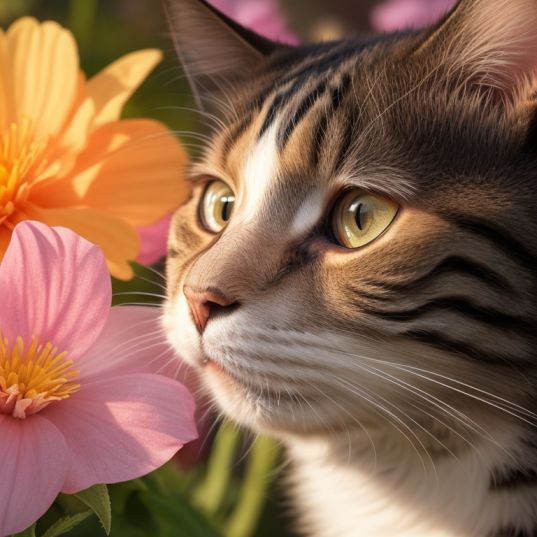
Cats possess a remarkable array of senses that set them apart as some of nature’s most finely tuned hunters. Their acute senses of smell, sight, and hearing work in harmony to create a sensory experience that is far superior to that of humans.
Their sense of smell is extraordinary, enabling them to detect scents from considerable distances. Cats’ olfactory prowess helps them identify familiar scents, assess potential threats, and even detect changes in the environment. Their eyes, equipped with a high number of light-sensitive cells, grant them excellent night vision and the ability to see in low-light conditions. This ability is inherited from their nocturnal ancestors and supports their hunting activities during the darker hours.
Perhaps most famously, cats’ hearing is incredibly acute, capturing a wide range of frequencies and allowing them to pinpoint the source of even the faintest sounds. This auditory precision serves both as a survival tool and a means of detecting movements, even those too subtle for human ears.
Combined, these exceptional senses empower cats to navigate their world with an unmatched level of perception and awareness. Their sensory prowess plays a crucial role in their interactions with both their environment and the people around them.
The Role of Body Language:
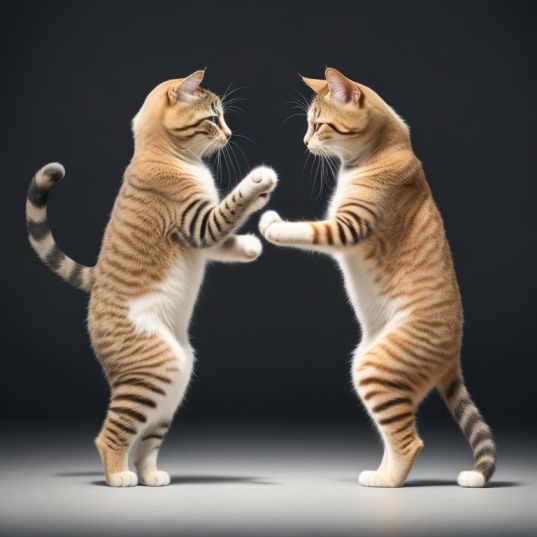
Communication goes beyond words for cats, and their ability to interpret body language plays a fundamental role in understanding their world and the people in it. Cats possess an innate talent for observing and decoding non-verbal cues, both from their fellow felines and from humans.
Cats keenly observe facial expressions, gestures, and even the tone of voice to gather information about a person’s intentions and emotions. A relaxed posture and slow blinking might signal trust, while tense body language could trigger caution. Cats use their body language to communicate as well, from the twitch of a tail to the arch of their back.
It’s essential to remember that cats’ interpretation of human body language might not always align with our intentions. A raised hand, for instance, might appear threatening to a cat. Understanding the nuances of cat body language and respecting their boundaries is crucial for building a harmonious relationship. By recognizing and adapting to these non-verbal cues, we can establish a stronger connection with our feline companions.
Scientific Studies and Findings:
Researchers have embarked on studies to unravel the intriguing question of whether cats possess the ability to discern human intentions. These studies often involve observing how cats react to different people and their behaviors. However, the results remain inconclusive due to the complexity of interpreting feline behavior.
While some studies suggest that cats can react differently based on human behavior, critics argue that these behaviors might be influenced by other factors, such as scent or body language. The challenge lies in isolating the specific factor that triggers a cat’s response.
In one notable study, researchers presented cats with various scenarios involving unfamiliar individuals displaying positive and negative behaviors. The cats exhibited mixed reactions, indicating that their responses might not be solely tied to a person’s moral character.
As the debate continues, it’s clear that the intricacies of feline behavior make drawing definitive conclusions a challenging task. The enigmatic nature of cats adds to the allure, encouraging us to observe and appreciate their unique interactions with the world around them.
Empathy and Emotional Detection:
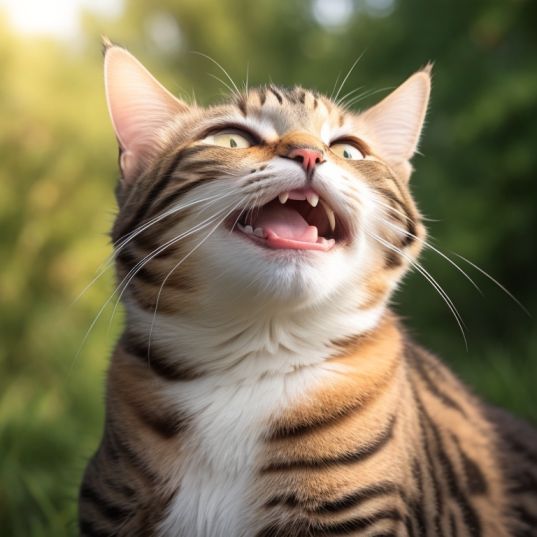
Empathy, often considered a human trait, has garnered attention in the animal kingdom, including among our feline companions. While scientific understanding is evolving, some studies suggest that cats might possess a level of empathy and emotional detection that contributes to their reactions toward humans.
Observations of cats responding to human emotions, such as soothing a distressed person or comforting them during moments of sadness, hint at their ability to pick up on subtle emotional cues. Cats might sense changes in energy, body language, and even scent associated with various emotions.
These empathetic behaviors could be rooted in survival instincts or might be a result of the deep bonds cats form with their human caregivers. However, researchers are cautious about over-interpreting these behaviors, as they could also be influenced by a cat’s desire for physical comfort or familiarity.
Intriguingly, whether driven by empathy or other factors, cats’ ability to detect and respond to human emotions adds a layer of complexity to their interactions and deepens the mystery surrounding their intuitive behaviors.
Inherited Instincts from Wild Ancestors:

Cats’ behaviors often carry echoes of their wild ancestors, stemming from their evolutionary journey as solitary predators. The idea that cats can sense whether a person is good or bad might find its roots in these inherited survival instincts.
Wild cats relied on quick assessments of potential threats to ensure their survival. A cat’s cautious approach to unfamiliar situations or individuals might reflect an instinctual response to the unknown. This inherited wariness could serve as a self-preservation mechanism, allowing cats to maintain distance from potential dangers.
While domestication has brought cats closer to humans, these ancient instincts remain part of their genetic makeup. The ability to read human behavior could be an adaptation of their primal skills to the dynamics of human interactions. This perspective reminds us that cats’ actions often stem from deeply ingrained traits developed over countless generations, enriching our understanding of their complex behaviors in the modern world.
Case Studies and Personal Stories:
Anecdotal evidence abounds of cats exhibiting unusual behaviors around specific individuals, fueling speculation about their ability to discern human character. While scientific research provides insight, real-life case studies and personal stories from cat owners contribute a human touch to the discussion.
These stories often describe cats reacting positively or negatively to certain people, seemingly in response to the person’s behavior or demeanor. Tales of cats cuddling up to individuals who offer kindness or avoid those with negative intentions are shared across communities. However, interpreting these anecdotes can be challenging due to factors like cats’ varying personalities and sensitivity to subtle cues.
These accounts highlight the deep bond between humans and their feline companions, sparking curiosity and contemplation about the nature of these connections. Case studies and personal stories provide a rich tapestry of experiences that underscore the enigmatic relationship between cats and humans, inviting us to explore the depths of feline intuition and their role in our lives.
Also Read-
Other Factors Influencing Cat Behavior:
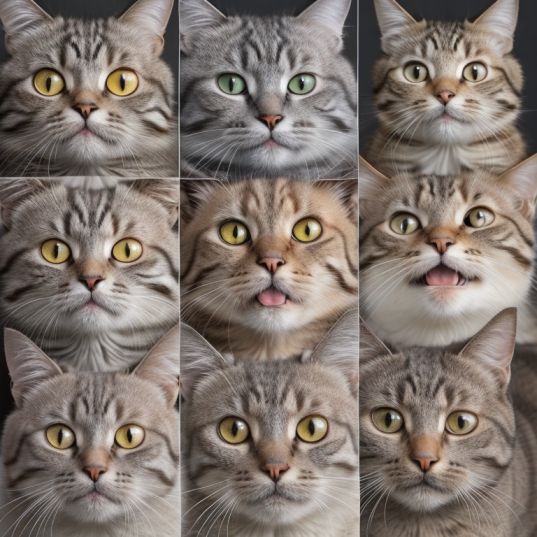
While the notion of cats sensing human intentions is intriguing, it’s important to recognize that a variety of factors beyond intuition can influence a cat’s behavior towards individuals. Past experiences, socialization, and environmental cues all play significant roles.
Cats remember and react to experiences, both positive and negative. A cat might be cautious around a person based on a previous encounter, regardless of that person’s character. Socialization during a cat’s early life can shape their comfort levels with different people. Cats raised around diverse individuals may exhibit more openness and tolerance.
Furthermore, cats are highly attuned to their environment, responding to scents, sounds, and visual stimuli. An individual’s posture, clothing, or even the presence of other animals can influence a cat’s response. Considering these factors helps paint a more comprehensive picture of why cats react the way they do, reminding us of the intricate interplay between nature, nurture, and circumstance in shaping feline behavior.
The Mystery Persists:
Despite ongoing research and the sharing of anecdotes, the question of whether cats possess an innate ability to discern human character remains a complex puzzle. While there are indications that cats might respond differently to various individuals, the true extent of their perception remains elusive.
Scientific studies grapple with interpreting feline behavior, as cats’ reactions are influenced by an intricate web of factors. The interplay between instincts, sensory perception, past experiences, and even human-animal bonding makes it challenging to draw definitive conclusions.
The allure of this mystery lies in the enigmatic nature of cats themselves. Their independence, sensitivity, and seemingly intuitive behaviors create a realm of fascination and speculation. As we continue to appreciate the multifaceted relationships between cats and humans, the ambiguity surrounding their abilities reminds us that these captivating creatures still hold secrets that intrigue and inspire us. The journey to understanding the depths of feline perception is ongoing, inviting curiosity and a sense of wonder into the realm of our beloved companions.
FAQs (Frequently Asked Questions)
Q1: What do cats do when they sense a bad person?
Cats are highly perceptive creatures. When they sense something amiss with a person, they might exhibit cautious behavior. This can range from keeping their distance to displaying signs of alertness or even hissing. However, it’s important to note that cats’ reactions can also be influenced by factors like scent, body language, and past experiences.
Q2: Can cats sense something wrong with a human?
Yes, cats have a remarkable ability to detect subtle changes in their environment, including shifts in human behavior or emotions. They might respond to a person’s tension or discomfort by acting more reserved or skittish.
Q3: Why do cats like a certain person?
Cats often form strong bonds based on positive interactions. Factors such as a person’s demeanor, scent, and the way they interact with the cat can contribute to forming a connection.
Q4: Do cats understand kindness?
While cats may not grasp the concept of kindness in the same way humans do, they do respond to gentle handling, positive interactions, and a calm demeanor.
Q5: How do cats tell you something is wrong with you?
Cats might express concern if they sense something is wrong with you. They could exhibit heightened attentiveness, offer comfort, or act unusually affectionate as a way to show support.
Q6: Can animals sense if you’re a good person?
Animals, including cats, can pick up on cues from human behavior and body language. While they might not make moral judgments, they can react positively to individuals who treat them well.
Q7: Why is my cat so clingy all of a sudden?
Sudden clinginess in cats could be due to changes in their environment, health issues, or seeking comfort. Observing any other behavioral changes or consulting a veterinarian might help determine the cause.
Q8: Why is my cat sleeping next to me all of a sudden?
Cats might seek proximity for warmth, comfort, or to bond with you. If your cat’s behavior changes suddenly, it’s worth checking for any underlying issues.
Q9: Why is my cat being clingy?
Clinginess could arise from various reasons, including changes in routine, health concerns, or simply seeking attention. Understanding the context can help address their needs.
Q10: Do cats prefer female owners?
Cats can form strong bonds with any gender. Preferences often depend on the individual cat’s experiences and interactions.
Conclusion:
As we conclude our exploration, it’s clear that while cats’ behavior might indicate some level of perception, the answer isn’t black and white. The bond between humans and their feline companions is unique, and our cats’ reactions add to their enigmatic charm.
Final Thoughts:
Embrace the curiosity surrounding your cat’s behavior and the bond you share. Share your observations and stories with fellow cat enthusiasts, continuing the conversation about the fascinating world of feline intuition. Whether or not cats can truly sense a person’s character, their ability to connect with us remains a source of wonder and joy.
